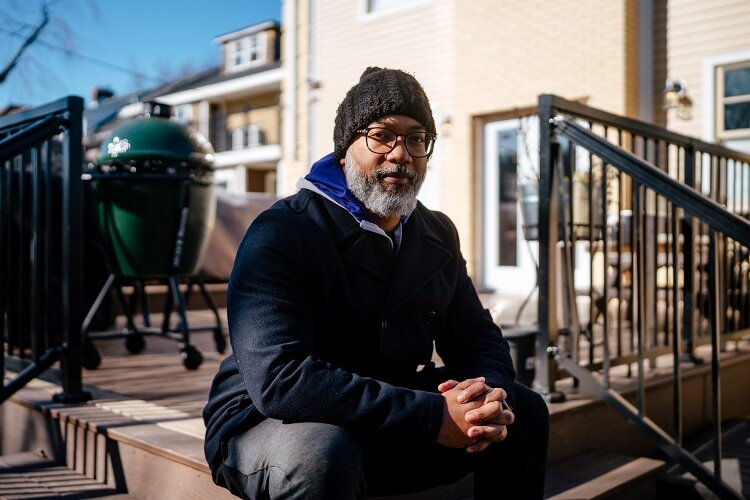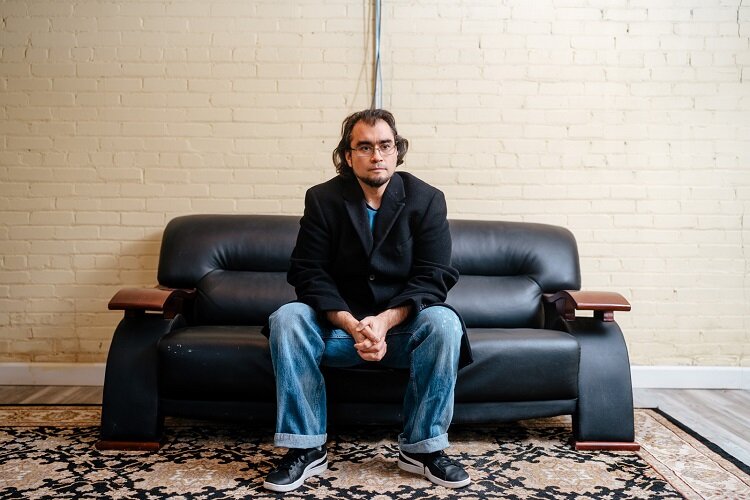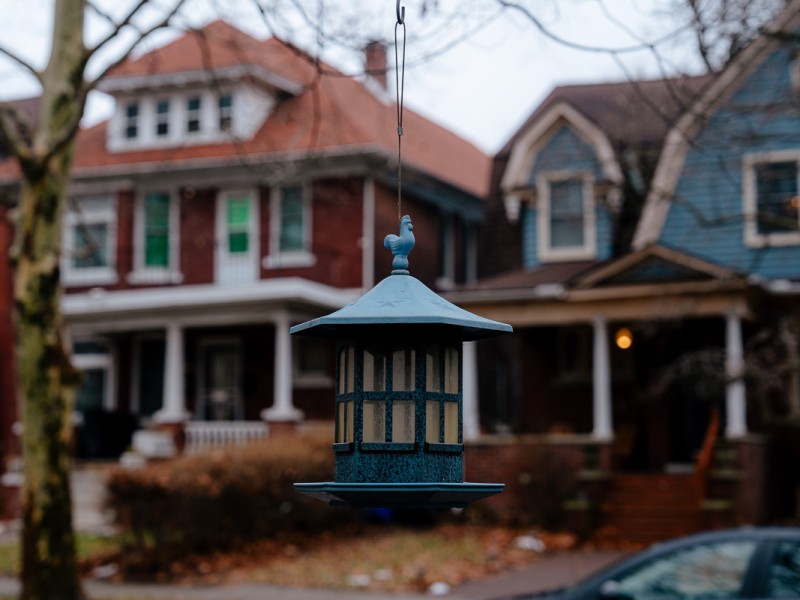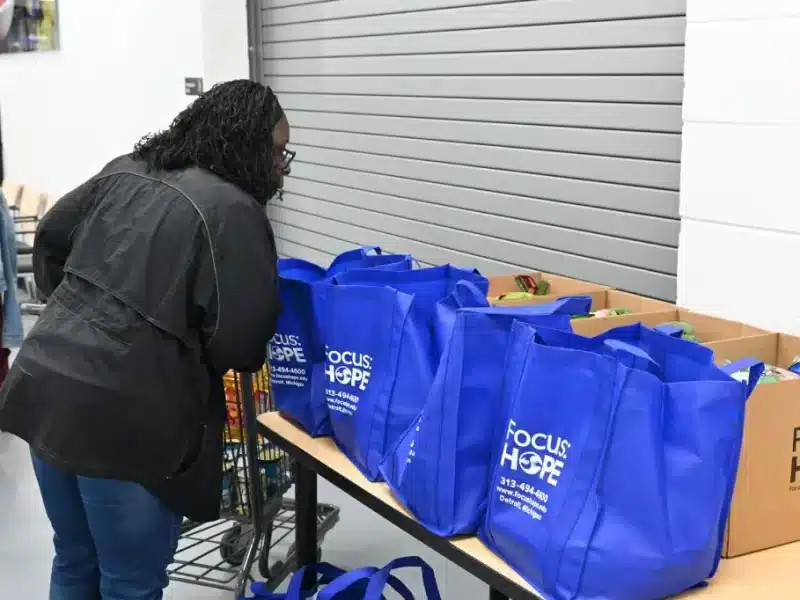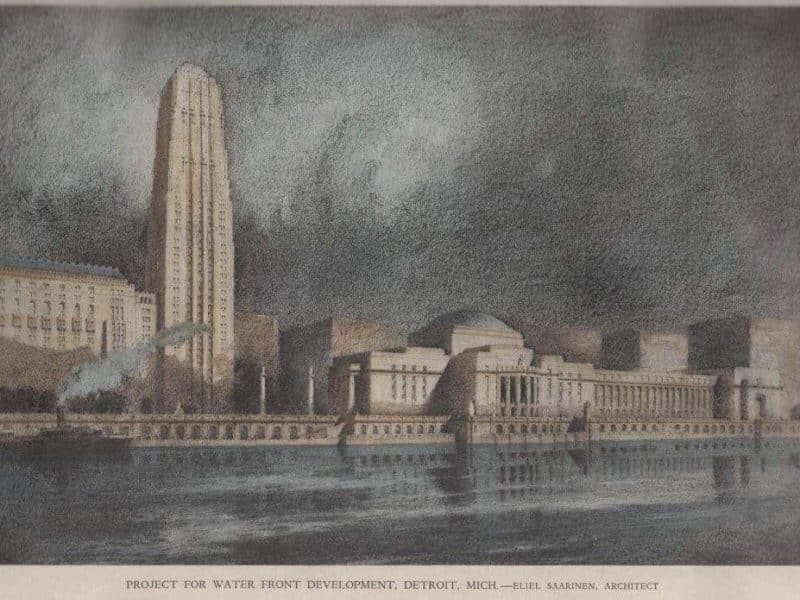What impact are minority developers having on Detroit’s skyline?
These four Detroit developers are sharing their perspectives on minority development in the Motor City.
Developer Alex Pereira’s eye-catching home renovations have certainly drawn some attention to Detroit’s Woodbridge neighborhood.
His most well-known project is probably the “Lorax” House. Originally built in 1900, the historic home, located at 4759 Trumbull Ave., was on the verge of collapse
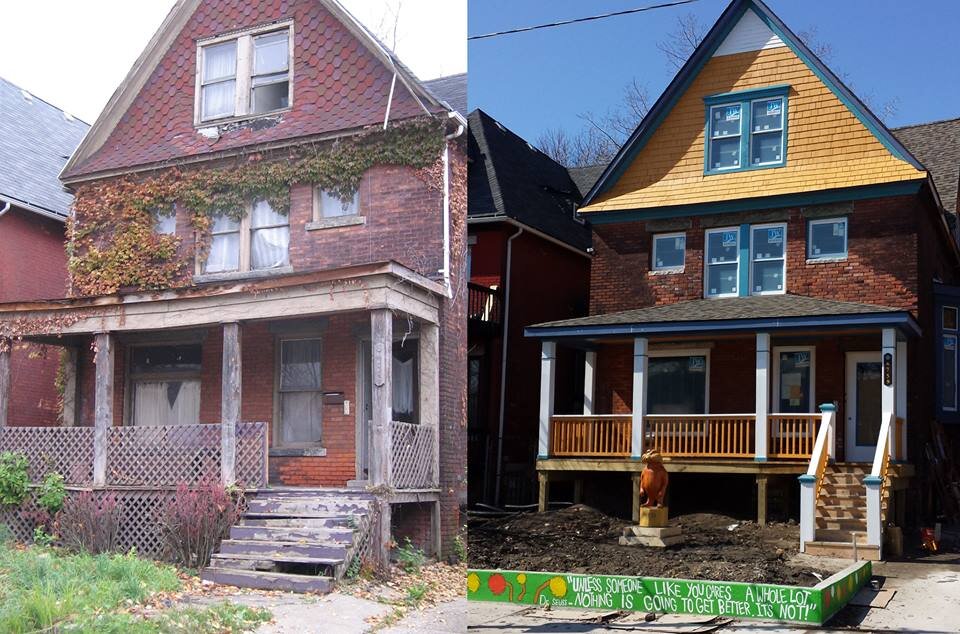
when Pereira bought it in a Wayne County tax auction in 2012. His team converted the building into a energy efficient five-unit apartment space with three one-bedroom apartments, a studio apartment, and a live/work space with an attached commercial art gallery.
But it’s what he did with the exterior that really got people talking. Pereira added a lively color scheme and put a carved statue of the Lorax, a character from one of his favorite Dr. Seuss stories, in front of the house, along with an accompanying mural. Other high-profile Woodbridge remodels by the developer include a bright blue, yellow, and green house inspired by the 2009 Pixar film “Up” and an “Alice in Wonderland”-themed home. The renovations have been the source of both praise and criticism, but Pereira doesn’t seem to mind his detractors.
“There’s people that love it and people that don’t love it. Like everything else, everyone has an opinion,” he says.
A native of Bolivia, Pereira moved with his family to California when he was 9 years old and later relocated to Michigan with his wife. He worked in the mortgage industry prior to becoming a developer and formed his company, Secure Realty Investments, in 2008, seeing opportunities during the housing market crash. As for
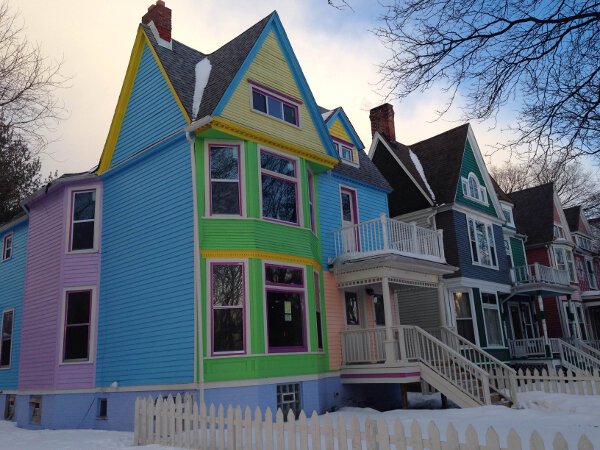
his flair for flashy design, he attributes that in part to his experiences growing up in South America.
“My Latin roots certainly lead to a lot of colorful things, because a lot of our architecture uses uniqueness to differentiate itself,” says Pereira. “I also felt that it was important to be establishing a sense of place, taking back these buildings to their roots with the painted ladies, et cetera, of historic architecture.”
Pereira recently wrapped up an eight-unit condo development in Woodbridge called The Periwinkle that’s a mix of new construction and renovation. Other Detroit projects include a rehab of the J.D. Baer mansion in Woodbridge and the Dream! Apartments in the Milwaukee Junction.
While Pereira’s Latino background has informed his work, he sees it as just one of many elements shaping his work in Detroit’s challenging development landscape.
“This is an industry that rewards performance, and the barriers to entry are ludicrously high,” he says. “Being a minority simply adds an additional layer of complexity to it.”
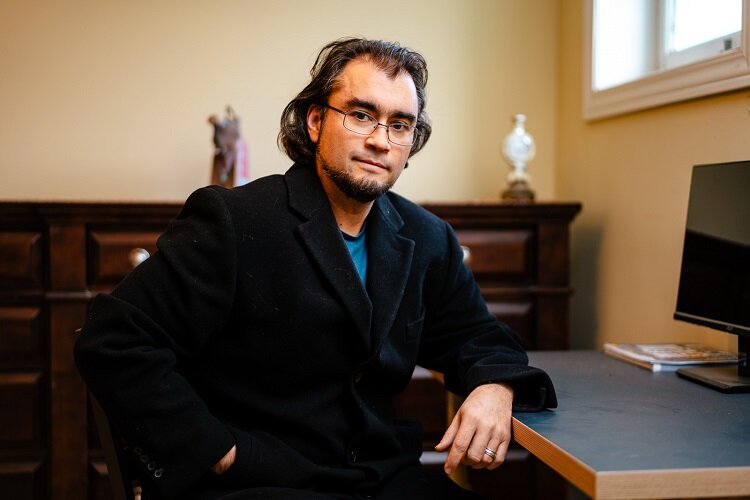
Challenges and collaboration
While Pereira is just one in a handful of Latinos working in his field in the Motor City, there are many more minority developers in Detroit. Jason Jones of Tekton Development is part of that community and has been working to encourage more collaboration among like-minded BIPOC developers.
Early in his career Jones worked as a financial consultant in Chicago. The native Detroiter was drawn back to the Motor City in 2000 by an investment opportunity that involved rehabbing and selling single family homes. That work paid off, and Jones found that he really enjoyed it. So he dived into the development field full-time.
“Development is an extraordinary opportunity to really manifest change in people’s lives,” says Jones. “You literally get to change the landscape of the city in which you live. The key is to make sure you do it the right way to engage with the community and try to deliver a product that folks not only want to see, but are happy to live in and interact with.”
Jones has been involved with numerous real estate companies since that time. In 2016, Jones founded Tekton Development, a company that specializes in developing multi-family and mixed-use projects. He currently serves as its principal developer. The company focuses its efforts in Detroit and the surrounding area, and has invested over $36 million in multifamily, land, and office developments in several states including North Carolina, Georgia, and Michigan.
Tekton recently finished a three-story condominium with a distinctly modern look at 4530 Commonwealth St. in Woodbridge, partnering with Dominion Property Group on the complex. Right now, the company is working on two other Woodbridge-based projects, a six-unit complex and 65-unit condo called the Scripps District being built in partnership with Civic Companies and Robertson Brothers Homes.
Reflecting on the broader impact of African-American developers in the city, Jones says it’s understated, relative to population demographics, but “certainly larger than what you would find in some other major cities across the country”.
Detroit’s minority development community operates on a variety of different scales. On the one hand, there are well-established figures like Jerome Morgan of Morgan Development, a multi-billion dollar developer firm specializing in larger homes, and Melvin Washington, founder and president of the Phoenix Group Companies, which focuses on affordable and market rate housing.
Then, Jones says there is “a significant cadre” of Black developers operating a little below that level who are involved with firms like City Growth Partners, Century Partners, Queen Lillian, and Develop Detroit.
Queen Lillian, for example, has been partnering with The Platform on to build a five-story $60 million project in Midtown. And Develop Detroit, headed by Dennis Archer Jr., has been active with single family homes and multi-use complexes like the Sugar Hill Mixed Use Development in Midtown.
There are a substantial number of minority developers involved with medium-sized projects ranging anywhere between $3 million and $25 million, according to Jones. However, beyond that point there are almost no Black developers involved with the city’s largest developments, a situation he attributes to a lack of access to capital.
Despite that challenge, the efforts of Black developers in the city have been bolstered in recent years by the emergence of new industry groups like Building Community Value (BCV) and the Real Estate Association of Developers (READ). BCV is a nonprofit headed by Chase Cantrell dedicated to helping newcomers learn the ins-and-outs of small-scale real estate development. READ, co-founded in Detroit by Jones, aims to be a collaborative organization where more experienced minority developers can work together in a way that benefits both them and the community at large.
“Our goal is to make sure that Black developers can make those investments and then pay them forward through their hiring practices all the way into the community,” says Jones.
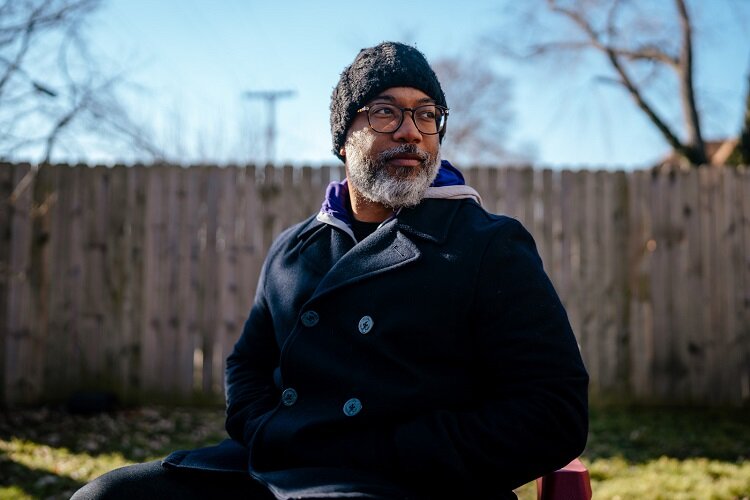
Focus on Community Development
Beyond more traditional developers and companies, there are also a number of well-known black-led community development organizations making a footprint in Detroit.
Among the most prominent of these is the East Jefferson Development Corp (EJDevCo). It’s headed up by Derric Scott, who previously did real estate work with the Ford Motor Land Development Corporation. EJDevCo is the for-profit development arm of Jefferson East Inc. (JEI), a neighborhood organization that serves low-income populations in five neighborhoods along the East Jefferson corridor. The corporation was launched by JEI about five years ago and has been working with the nonprofit to bring an inclusive vision of development to the communities they serve, particularly the neighborhood of Jefferson Chalmers.
“Our goal was really to start directly seeing real estate activity happen in a market that was starting to see some growth but keeping ahead of what we call displacement pressures or market pressures to make sure that we could keep Detroiters in their homes as these communities develop,” says Scott.
EJDevCo currently oversees approximately $120 million in development projects.
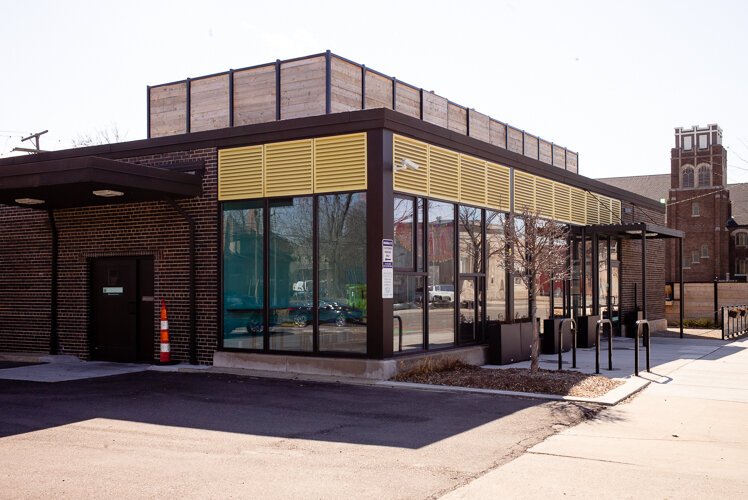
The most high-profile of these is undoubtedly Norma G’s, a bar and eatery specializing in Caribbean cuisine that has the distinction of being the first full-service restaurant in the area in about three decades.
The organization has several other endeavors in the works, including two more projects expected to break ground later this year. One of those is a multi-vendor food hall at 14326 E. Jefferson Ave. that will feature vendors selected by community members. The other is the renovation of a former Schwinn Bike Shop at 14229 E. Jefferson Ave. that will serve as the JEI/EJDevCo headquarters and feature first floor restaurant/retail space.
Despite successes like these, Scott there are still obstacles to developing the area further.
“It’s really difficult to get development done deep in the neighborhood, we’re heavily subsidizing,” he says. “With some of these projects you really need the support of philanthropy or the city, so while there’s a lot of interest, there’s certainly still the challenge that exists that without a good deal of subsidy the buildings don’t come back online.”
In regards to other minority-led community development organizations working in the city, he remarks there have been recent leadership transitions of late with some of the larger nonprofits. However, Scott says he’s keeping his eye on Antoine Jackson of MACC Development and believes that with the support of the board of directors that organization is “positioned to see a good amount of development happen” along that Mack Avenue corridor.
Speaking more broadly, Scott believes it’s worth noting that Black and Latino developers in the city tend to be doing work in the city’s neighborhoods. With that in mind, he thinks that to help minority developments the city should be directing more economic development tools like Brownfield tax credits to the areas where they are more likely to be working.
In addition to that, he thinks that lenders need to be doing more than giving lip service to equitable development by offering minority developers access to funds in a way that actually lowers barriers that prevent access to capital.
“It is laughable that last year after the George Floyd incident, everybody was throwing together funds for minority businesses and minority development,” Scott says. “And the challenge with many of those funds was that while they were focused on minorities and trying to get capital to them, the terms are riskier, worse than going to a commercial lender.”
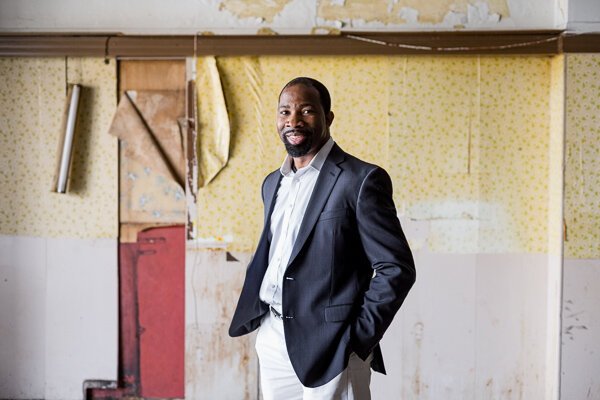
Developing the industry
There are other ways minority developers are giving back to the community as well. AGI Construction, a Detroit-based firm run by a husband and wife team with a combination of Latino, South Asian and Native American roots, demonstrates an interesting example of how this is being done.
Luis Ali is a licensed electrician with more than 20 years in the skilled trades as well as a veteran who still serves with the National Guard. His wife Tanya Saldivar-Ali has a background that includes experience with nonprofits, corporate banking, and the manufacturing sector. They formed their business in 2008, and have experience with residential, commercial construction, general contracting, and property management. Over the last four years, their company has been focusing on design-build working with clients that include nonprofits, churches, schools, and small business owners on a variety of different projects.
“We don’t do competitive bidding. Most of our projects are relationship-based,” says
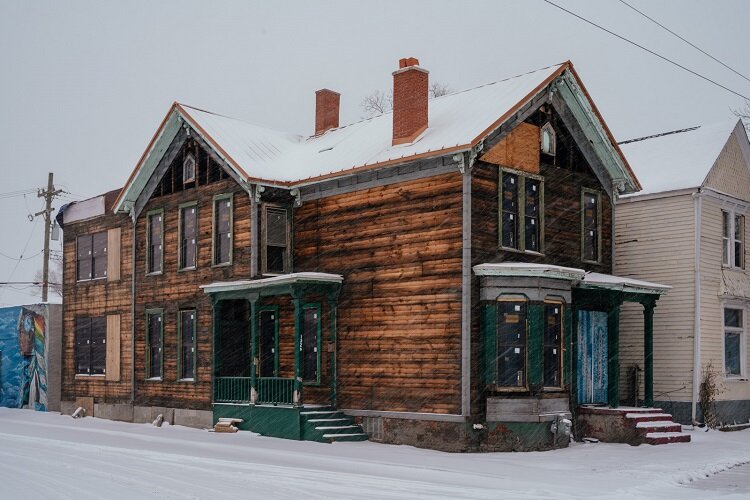
Saldivar-Ali. “We have a waiting list of projects where people want to work with us exclusively, because we really work with the clients, teaching them and helping them understand to make informed decisions for themselves.”
The project the couple is most excited about at the moment, however is the 18th Street Design Build Green Hub. AGI Construction is now in the process of transforming a Queen Anne-style residential house in Southwest Detroit’s Hubbard-Richard neighborhood into a community hub that will assist local community members in learning about and getting involved with the construction and design fields. Training provided by Detroit Future OPS, AGI Construction’s social development arm, will involve workshops on sustainable green building practices and energy efficient insulation.
The project is aimed at addressing a shortage of skilled trades workers in the industry while also providing access and mentorship to residents that can lead to decently paid careers. What’s more the design of the hub and the programming reflects input from residents that came out of a community engagement process.
“In essence, it’s ended up being an incubator space to build capacity for other minority contractors and it’s also engaging community residents in the development that’s happening around them,” says Saldivar-Ali.
Construction on the facility started this past summer. The owners of AGI Construction hope to have a soft launch this summer, followed by a grand opening this fall.
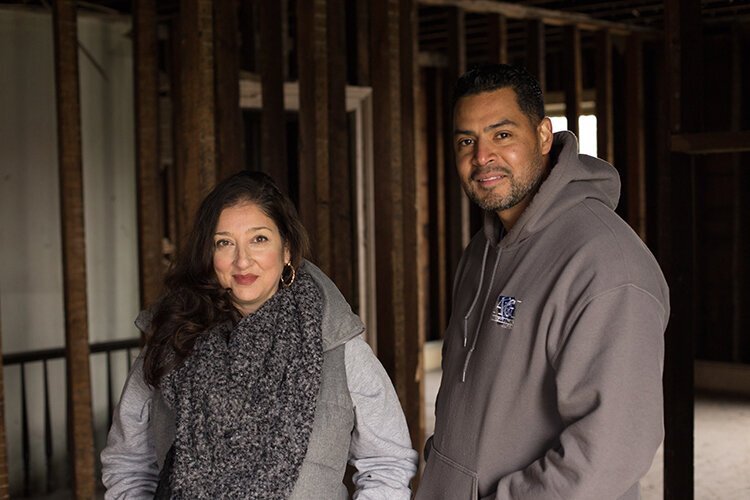
Moving forward
Doing development work in Detroit at the moment is certainly not a walk through the park. Inflation and a tight labor market connected to the pandemic have made it difficult for everyone in the industry, and minority developers can often face additional obstacles like access to capital.
Saldivar-Ali believes, while there has been some movement on the long-standing challenges minority developers have faced in the city, there is still much work to do.
“For many many years, we were just part of the labor force, not really part of the decision-making process,” he says. “I think there’s definitely more attention to the disparities that exist within the design-build ecosystem. But I think the challenge is having more developers and more contractors have ownership in these projects.”
Jones also thinks the local environment has improved for minority developers over the last few years, a change that’s come out of a significant push for access. And while it’s still in its infancy, he hopes to see more progress in the coming years.
“I don’t just want to see Black developers doing hundred-unit apartment buildings, I want to see somebody putting a skyscraper up one day soon,” he says. “So hopefully you’ll see Black developers literally changing the skyline of our city.”
Photos by Nick Hagen, except where otherwise noted.
This is part of the Block by Block series, supported by FHLBank Indianapolis, that follows minority-driven development in Detroit.
